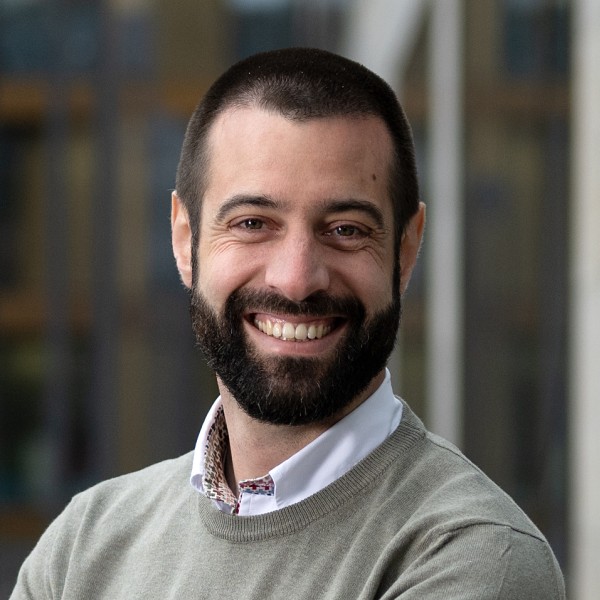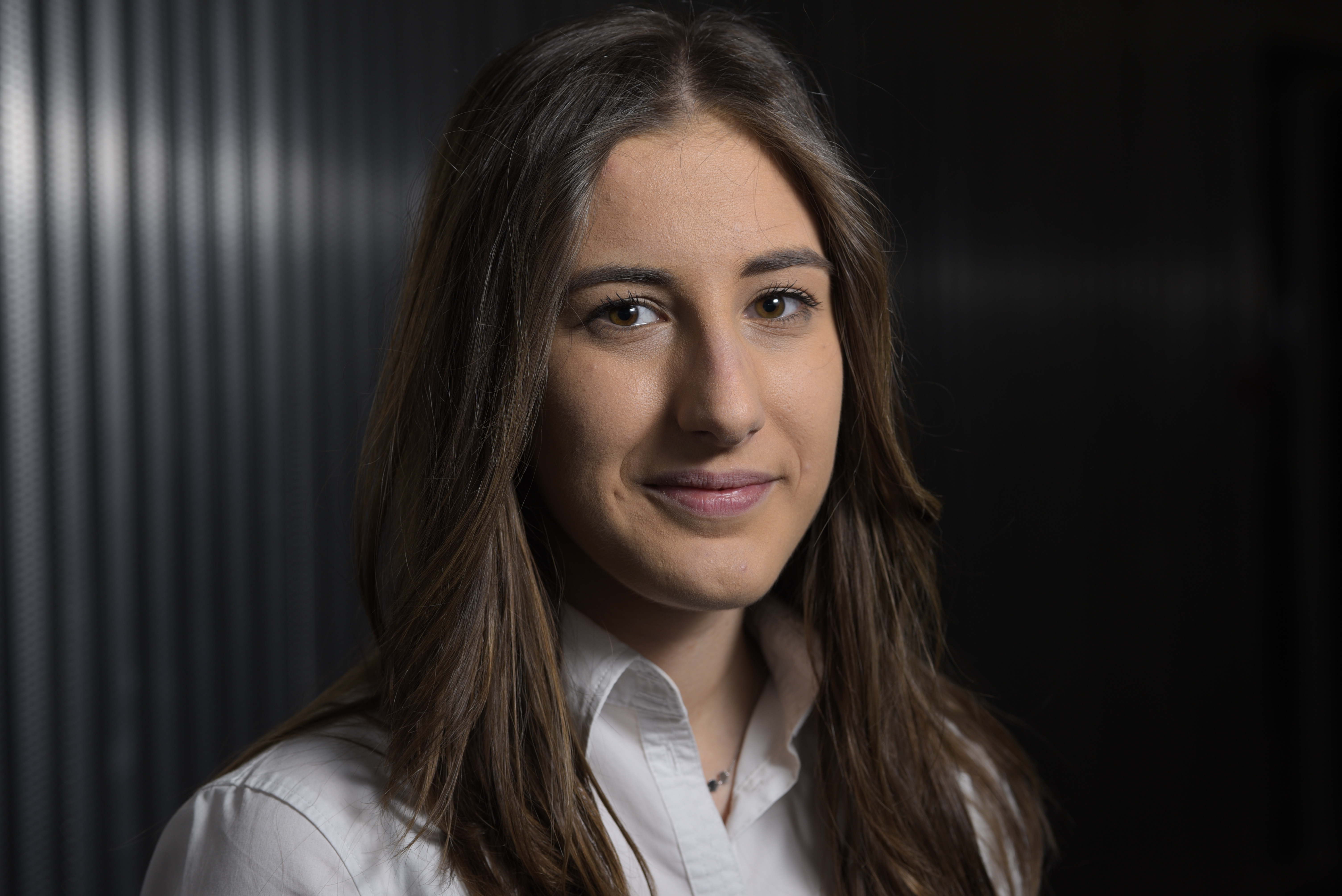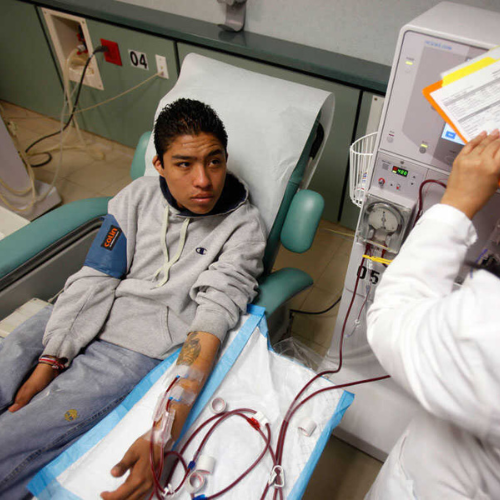Team
At EssentialTech Centre we strive for a world free from extreme vulnerability, which has 3 main causes: Humanitarian crises, extreme poverty, conflict and violence. These causes are aggravated by climate change.



Christian Lenz joined the Centre as Head of Humanitarian Action Division in January 2026, where he steers applied research, partnerships, and programmes at the interface of engineering and humanitarian action. He is a mechanical engineer trained at ETH Zurich and holds an Executive MBA from Politecnico di Milano. He brings nine years of experience from the International Committee of the Red Cross, where he held senior operational and strategic roles spanning field coordination, regional engineering portfolios, and institutional innovation.
Before joining the ICRC, Christian co-founded early-stage ventures and led technology developmentfrom research to market. This experience continues to inform his focus on execution, scalability, and the practical constraints of innovation beyond the laboratory.
More recently, he has been advancing his practice through studies in designing resilient regenerative systems. His work increasingly emphasises place-based approaches, long-termresilience, and responsible innovation that links humanitarian response, evelopment, and ecological regeneration.



Dominika joined Tech4Dev program in 2024 as a Project Manager, where she leads innovation projects in collaboration with research teams, international organisations, and local partners. Her work bridges technology transfer and sustainable development, with a focus on delivering context-adapted solutions in low-resource settings.
She brings over a decade of experience managing projects and partnerships across the humanitarian, development, and climate sectors. She has worked with organisations such as the Gold Standard Foundation, Medair, CARE, and Special Olympics, working on initiatives in social inclusion, environmental sustainability, and emergency response.
Before joining Tech4Dev, she led Medair’s innovation partnerships programme, building collaborations to pilot technologies - from blockchain-based tools to biodegradable materials - in crisis-affected settings. At Gold Standard, she worked on strategic initiatives in the carbon markets and helped advance sustainable finance solutions. Earlier in her career, she managed community projects on rural development, disability inclusion, and migration across Latin America and the Balkans.
She holds a Master’s in Human Rights and Humanitarian Action from Sciences Po Paris.



Dr. EmelineDarçot is a project manager at the EssentialTech Centre in Lausanne, Switzerland, which harnesses innovation in support of sustainable development,humanitarian action and peace promotion. She is currently coordinating the Engineering Humanitarian Action programme within the Humanitarian Division.
She holds a PhD in Life Science from the University of Lausanne (Switzerland). After a PhD and a postdoctoral position in biomedical imaging at the University Hospital of Lausanne (CHUV), Emeline joined the EPFL EssentialTech Centre in 2021 as a project coordinator on the Ren’All Care project. She then joined the EPFL Research Office in 2022 as project manager and coordinates since then the Engineering Humanitarian Action programme within the Humanitarian Division of the EssentialTech Centre.



Klaus Schönenberger obtained an MSc in Microengineering(1993), followed by a PhD (1996) from the Swiss Federal Institute of Technologyin Lausanne (EPFL). After a post-doc at Lawrence Livermore National Laboratoryin California, he spent over 10 years in the medical devices industry inleading positions such as Vice-President of Worldwide R&D in a $100mcompany and Global Vice-Resident of Research and Technology in a $1bn company.In 2009, as he was working for a medical devices company, he received a shock: he realized that there is a huge imbalance in access to medical technology inindustrialized versus low and middle-income countries. After a closer look, he discovered that he imbalance’s main cause is a mismatch between existing technologies and business models, with those needed in low and middle-income countries. He decided to leave industry, and, in 2009, he co-founded the EssentialMed Foundation, an innovative non-profit venture. In 2011, realising that both technology and business models needed a profound rethinking, he joined EPFL where he launched EssentialTech, an initiative inspired by the philosophy of EssentialMed but expanded to a much wider portfolio of "essential" technologies. The university-wide program aims to develop innovative technologies and business models, for the benefit of sustainable development in low and middle-income countries. In this role, he has already launched and overseen a dozen large projects. Major Humanitarian actors such as the ICRC and MSF took notice of the innovative approach proposed and decided to collaborate in 2015-2016. This has resulted notably in the joint creation between EPFL and ICRC, of the Humanitarian Tech Hub at EPFL. In 2017, Klaus co-directed and launched a MOOC(Massive Open Online Course) titled “Technology Innovation for Sustainable Development” which aims to spread the unique methodology and approach worldwide. As of today, more than 12'000 people have enrolled. In 2018, EPFL decided to elevate EssentialTech to become one of its research centres, which Klaus currently leads as its Director. The EssentialTech Centre’s mandate is to harness science and technology to drives ustainable development, humanitarian action and peace. In this frame, he initiated solid collaborations with leading organizations such as the ICRC, MSF or the UN. One of the Centre’s flagship achievements is a digital x-ray imaging solution entirely developed for the context of LMICs. It has led to the creation of a multiple award-winning start-up company Pristem SA, which raised a record 14m CHF in its first and only round. Another spin-off of EssentialTechis HMCare, which is deploying a transparent surgical mask. Klaus is a co-founder in both start-ups. He currently serves as the chairman of the board of Pristem SA.



Luath joined the centre in 2024 to support the Centre's fundraising and communication strategy. With a MA in Business Studies from the University of Edinburgh, Luath has spent the last 15 years using her management skills to boost the capabilities and performance of NGOs and small businesses. As someone who is passionate about leveraging business expertise to support impactful humanitarian work, Luath's career has led her to work on diverse projects spanning human rights law and international justice, neglected diseases, refugee welfare and food insecurity. In 2016, driven by a desire to make a direct difference, she co-founded and led an NGO supporting refugees in vulnerable contexts. She now brings this experience to the Centre, focusing on the intersection of technology and positive social impact.



Mariazel Maqueda López holds a PhD in Microsystems and Microelectronics from the Swiss Federal Institute of Technology (EPFL), building on a strong foundation in nanotechnologies and telecommunications from her bachelor’s and master’s studies. In 2014, a life-changing volunteer experience in Nairobi’s slums with the nonprofit Amani inspired her to focus her career on empowering vulnerable communities.She has since worked with international nonprofits such as SéCoDev, Caritas Internationalis, and B Lab Switzerland, specialising in sustainable development. In 2020, Mariazel joined the EPFL EssentialTech Centre to establish and lead its PeaceTech Division. Under her leadership, the division leverages cutting-edge technologies to prevent violence, and foster peace, with a focus on addressing gender-based violence. Passionate about interdisciplinary solutions, she is driven to align advanced technologies with the urgent needs of developing regions.



Holding an MSc in Electrical Engineering from EPFL, Matthieu has led projects focused on developing appropriate technologies and sustainable business models for the Global South. He has a strong background in technical training, technology transfer, and fostering collaborations between academia and industry. Fluent in French, English, and German, Matthieu brings expertise in managing multidisciplinary teams and creating impactful solutions in medtech.



Nathalie holds an M.A. in Social Sciences. She has a rich background in humanitarian work and social impact projects, working with NGOs and international organizations. She has led diverse teams across Sub-Saharan Africa, the Balkans, Central America, and Switzerland, fostering cross-disciplinary collaboration and building cross-cultural partnerships to develop impactful solutions that advance societal progress. Her core areas of expertise include post-crisis recovery, gender-based violence, and forced migration.In her previous roles, Nathalie worked with the International Organization for Migration (IOM) in Geneva on anti-human trafficking interventions and served as an independent consultant specialising in strategic planning for humanitarian initiatives. She also contributed to socio-economic integration programs for refugees in Switzerland. Nathalie joined EssentialTech in 2021 as Head of Stakeholder relations and Fundraising before taking the Head of the Sustainable Development Division in 2023, Nathalie leads interdisciplinary innovation projects that strategically leverage technology to develop sustainable solutions for vulnerable communities. Her work focuses notably on improving access to essential health services, including neonatal care, oxygen therapy,and assistive devices, while empowering healthcare professionals and institutions in low-resource settings.



Rachel joined the Centre in 2023 as Senior Researcher & Programme Manager for the Future of Humanitarian Design project (HUD). Originally an engineer by training, Rachel has a decade of experience working in sub-Saharan Africa (Somaliland, Kenya, Rwanda, Uganda, Tanzania, Ghana, Nigeria) for startups, NGOs and as co-founder of a tech startup. Her research interests are in low resource/frugal innovation, understanding users and their role in design/product development and the role of the private sector in sustainable development. Rachel did her PhD at Delft University of Technology where she conducted research on frugal innovations in the water and energy sectors in East Africa.



Dr. Solomzi (Soli) Makohliso is the Deputy Director of the EssentialTech Centre, where he is actively involved in harnessing cutting-edge research to develop technology innovations that can leapfrog the development and drive sustainable impact in resource-constrained and vulnerable contexts. He is an experienced international entrepreneur with biomedical industry experience in the US, Switzerland and South Africa. He was previously a member of the Ministerial Task Team for the Valorisation of South African Technology Innovation for the Minister of Science & Innovation in South Africa and has held various advisory positions in the past in biotechnology innovation, and for the implementation of the South African Nanotechnology Strategy. He also served as the advisor to the Swiss government and developed their bilateral strategy with South Africa in science, technology & innovation. He received his B.Sc. in Computer Science & Physics at Rhodes University (South Africa) and another B.Sc. and M.Sc. in Biomedical Engineering at Brown University in the US and completed his Ph.D. at the Swiss Federal Institute of Technology in Lausanne (EPFL).



Sonia joined EssentialTech Center in 2022 as administrative assistant, bringing with her 30 years of professional experience in various fields such as International Organizations, not-for-profit Foundations, multinational companies, and real estate agencies. Her competencies range from human resources, finance, communication to general administration. At EssentialTech, Sonia is in charge of all administrative aspects of the Center and is the go-to person for any inquiries related to our activities.



Stefania joined the Centre in 2025 as Project Coordinator for the PeaceTech Division. She is a digital policy expert specialising in cyber and tech diplomacy, working at the intersection of policy and technology in international and multi-stakeholder environments. She has previously worked with institutions such as the CyberPeace Institute, DiploFoundation, and the Geneva Internet Platform. She holds a PhD in International Relations from the University of Geneva and her research interest focuses on how emerging technologies are reshaping diplomacy, peacebuilding, and internationa lcooperation.
.jpeg)

.jpeg)
Tiphaine is the Program Manager of Tech4Dev, an international cooperation programme co-funded by the Swiss Agency for Developmentand Cooperation. Launched in 2019, Tiphaine redesigned the programme's strategy for its second edition, focusing on climate, health, and energy. The initiative fosters collaboration between NGOs, research institutions, and local stakeholders, with support from governments and international organisations, aiming to deliver sustainable, context-adapted solutions to LMICs.
Tiphaine holds a PhD in Pharmacy from the Université de Rouen and a Master degree in Health Technology from Paris-Saclay University. She began her career as a product manager in diabetology within the pharmaceutical industry, before transitioning to entrepreneurship, developing a digital solution to accelerate diagnostic research in rare diseases. She has also worked as a strategic consultant and venture developer, helping public and private organisations bring technologies from idea to market.
Building on this experience, she founded MedSens,a venture aimed at improving healthcare access in medically underserved areas. With over a decade of experience, Tiphaine is passionate about designing projects from the ground up based on real-world needs, from needs analysis and market research to business model development, fundraising, and team recruitment.



Dr. Yan-Kim Tran is a skilled power electronics engineer specializing in DC-DC power conversion for medium-voltage applications. With expertise spanning the entire lifecycle of power supply systems—from simulation and component design to hardware assembly and control firmware—he has contributed to a wide range of projects, from small-scale power solutions to multi-megawatt systems.
Yan-Kim earned both his Master’s degree in Electrical and Electronic Engineering (2013) and his PhD in Power Electronics (2019) from EPFL. His extensive professional experience has shaped his ability to develop innovative and resilient power supply technologies.
Since joining the EssentialTech Centre in 2022 as a development engineer for the GlobalO2 project, Yan-Kim has played a key role in designing life-saving medical technologies, including a robust oxygen production device and a neonatal incubator for resource-limited and challenging environments. His recent work has reinforced his expertise in innovation under technical and economic constraints, emphasizing deployment, maintenance, and user-centric design.
Curious, motivated, and highly adaptable, Yan-Kim is passionate about creating impactful solutions at the intersection of power electronics, embedded systems, and sustainable technology.



Yves Daccord
Senior Advisor & Member of the International Advisory Board
Yves Daccord is a renowned humanitarian leader, international strategist, and changemaker, and a former journalist and expert in international relations. Born in Zürich, Switzerland, he earned a Bachelor of Arts in Political Science and International Relations from the University of Geneva and pursued postgraduate training in broadcast journalism, which led to a career at Radio Télévision Suisse in Geneva as a journalist and TV producer. Daccord joined the ICRC in the early 1990s and held various roles in conflict zones before becoming Director-General in 2010 until 2020. Currently, he leads Harvard University’s Edgelands Institute, addressing global challenges through innovative, cross-disciplinary approaches, and the #Principles4Peace initiative to reshape peace processes worldwide. He also chairs the Boards of Our Common Home, which promotes civic solutions to environmental challenges, and the International Human Rights Film Festival of Geneva. Yves has been advising the Center since 2020 on various strategic and partnership issues.
Do you have a project ?
Success stories

PeaceTech Innovation Hub

GlobalViewAid

Ren'All care
.webp)

